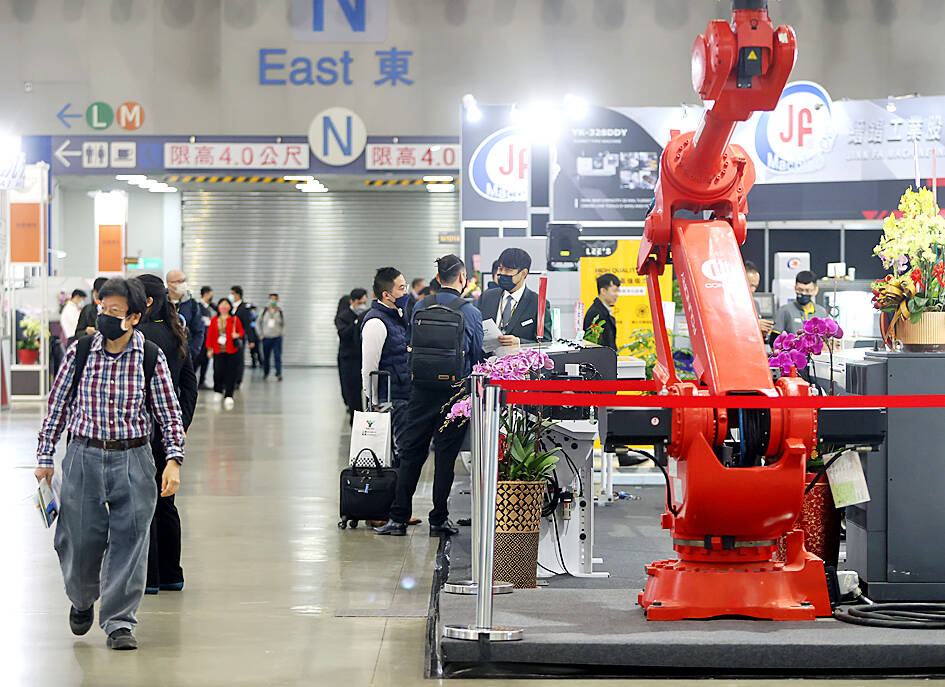The Taiwan Machine Tool and Accessory Builders’ Association (TMBA) yesterday said that it would continue to adhere to government sanctions against specific exports to Russia, but it did not directly address recent news reports that some of its members had been flouting the regulations.
In a statement, the TMBA said that since Russia invaded Ukraine in February 2022, the association has been keeping a close eye on the military conflict and has been reminding its members to stay in line with the export sanctions imposed by Taiwan and other countries.
Since April 2022, the government has been listing goods that are banned from export to Russia, primarily high-tech products.

Photo: CNA
The sanctions on the export of strategic high-tech commodities (SHTC), as they are called, are aimed at preventing their use by countries like Russia, Belarus, Iran and North Korea for military purposes, and at upholding Taiwan’s commitment to international cooperation, the government has said.
The original SHTC list included nuclear energy materials, electronic items, computers, telecommunications and information security products, sensors, lasers, navigation and avionics items, and maritime, aerospace and propulsion systems.
In January last year, the International Trade Administration (ITA) — the government agency that handles such matters — added 52 items to the SHTC list for Russia and Belarus, including chemical products and machine tools.
Citing an investigative report, the Taiwan-based news site The Reporter on Wednesday said that some Taiwanese machine tool suppliers had been taking advantage of the loopholes in export controls to sell sensitive products not only to Russia’s military, but also to its Lebedev Physical Institute and Budker Nuclear Physics Institute, which are on a banned list compiled by the US Department of Commerce.
The Chinese language Liberty Times (sister paper of the Taipei Times) on Tuesday reported that ITA officials had met with representatives of Taiwan’s machinery and machine tool exporters and their business associations earlier in the week, asking them to carefully investigate their clients to prevent breaches of the sanctions.
The TMBA yesterday said that it had asked its members to pay close attention to the sale and distribution of their products so that the goods do not indirectly end up in the sanctioned countries.
The TMBA added that it has advised its members to immediately stop supplying finished machine tool products and components to the sanctioned countries, regardless of whether the products are on the SHTC list.
That is a precaution to prevent the use of those products for unknown purposes, which could accidentally breach international export controls, the TMBA said.

Taiwan Semiconductor Manufacturing Co (TSMC, 台積電) would not produce its most advanced technologies in the US next year, Minister of Economic Affairs J.W. Kuo (郭智輝) said yesterday. Kuo made the comment during an appearance at the legislature, hours after the chipmaker announced that it would invest an additional US$100 billion to expand its manufacturing operations in the US. Asked by Taiwan People’s Party Legislator-at-large Chang Chi-kai (張啟楷) if TSMC would allow its most advanced technologies, the yet-to-be-released 2-nanometer and 1.6-nanometer processes, to go to the US in the near term, Kuo denied it. TSMC recently opened its first US factory, which produces 4-nanometer

GREAT SUCCESS: Republican Senator Todd Young expressed surprise at Trump’s comments and said he expects the administration to keep the program running US lawmakers who helped secure billions of dollars in subsidies for domestic semiconductor manufacturing rejected US President Donald Trump’s call to revoke the 2022 CHIPS and Science Act, signaling that any repeal effort in the US Congress would fall short. US Senate Minority Leader Chuck Schumer, who negotiated the law, on Wednesday said that Trump’s demand would fail, while a top Republican proponent, US Senator Todd Young, expressed surprise at the president’s comments and said he expects the administration to keep the program running. The CHIPS Act is “essential for America leading the world in tech, leading the world in AI [artificial

REACTIONS: While most analysts were positive about TSMC’s investment, one said the US expansion could disrupt the company’s supply-demand balance Taiwan Semiconductor Manufacturing Co’s (TSMC, 台積電) new US$100 billion investment in the US would exert a positive effect on the chipmaker’s revenue in the medium term on the back of booming artificial intelligence (AI) chip demand from US chip designers, an International Data Corp (IDC) analyst said yesterday. “This is good for TSMC in terms of business expansion, as its major clients for advanced chips are US chip designers,” IDC senior semiconductor research manager Galen Zeng (曾冠瑋) said by telephone yesterday. “Besides, those US companies all consider supply chain resilience a business imperative,” Zeng said. That meant local supply would

Servers that might contain artificial intelligence (AI)-powering Nvidia Corp chips shipped from the US to Singapore ended up in Malaysia, but their actual final destination remains a mystery, Singaporean Minister for Home Affairs and Law K Shanmugam said yesterday. The US is cracking down on exports of advanced semiconductors to China, seeking to retain a competitive edge over the technology. However, Bloomberg News reported in late January that US officials were probing whether Chinese AI firm DeepSeek (深度求索) bought advanced Nvidia semiconductors through third parties in Singapore, skirting Washington’s restrictions. Shanmugam said the route of the chips emerged in the course of an